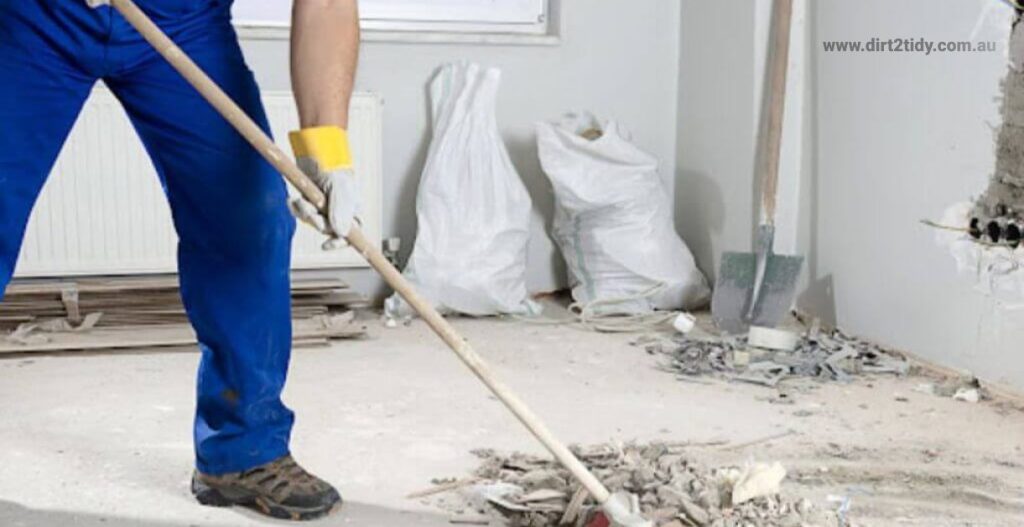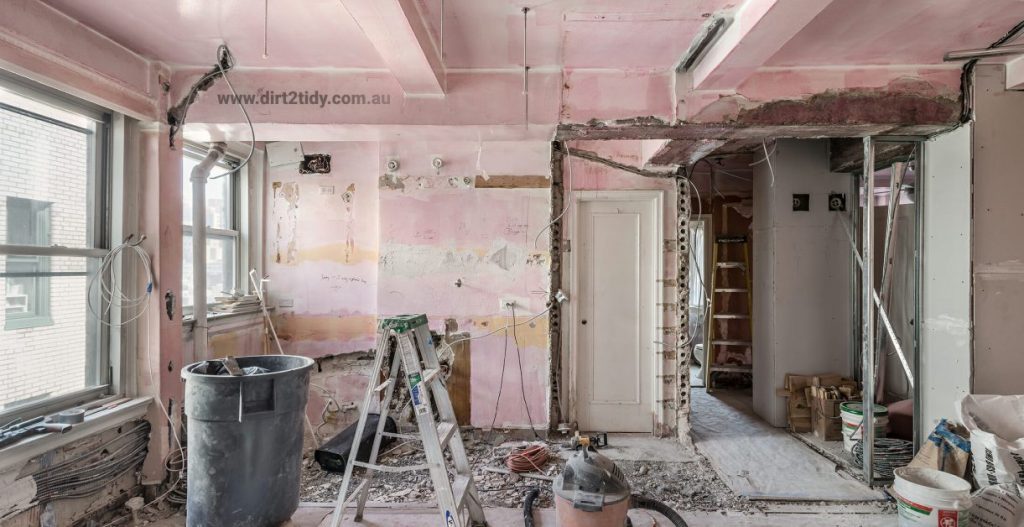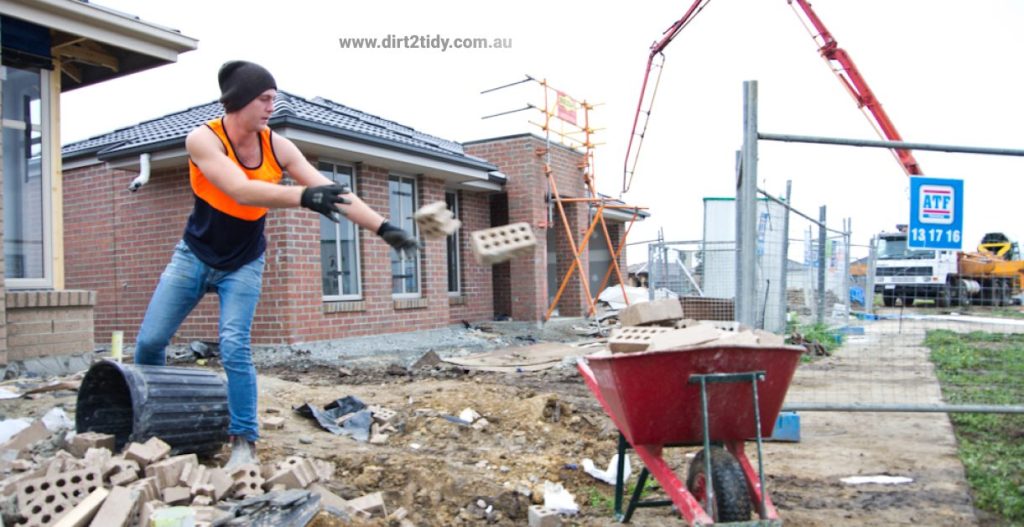Table of Contents
Before the builder gives you the keys, the construction clean up must be cleaned by a team of workers. Workers clean up construction sites for homes, businesses, and factories. Some cleaners offer to clean up after subcontractors once a day or once a week. Find out who can clean construction work sites and how much they pay.
When you hire a contractor or construction company to work on your house, they clean up after themselves. The place needs to be cleaned. Everyone is welcome and safe. So the owner doesn’t criticise their work, they want to keep it in good shape.

Who is to blame?
The customer is not responsible for cleaning up after construction is done. Most reputable companies that build or fix up homes offer the builders’ clean service.
They have to, no matter how clean the office is. Messes are inevitable. Garbage will always be there. When it comes to cleaning up, the construction business has special tools, equipment, and experience as per the cleaning requirements.
To keep a construction site safe and efficient, crews rely on more than just elbow grease—they use everything from heavy-duty brooms and mops to industrial vacuums, rubbish cages, and even fencing to keep debris contained. Proper safety gear is a must, too, with masks, goggles, and gloves considered standard kit.
Routine and ongoing cleaning is not just a nicety—it’s a necessity. If waste and debris are allowed to pile up, it can compromise both the safety of workers and the quality of the construction itself. That’s why maintaining a regular cleaning schedule, from initial pre-cleans to end-of-project scrubs, is simply part of the job.
What construction cleaners have to do on-site?
When after builders’ cleaners clean up a site, means cleaning up after subcontractors and getting ready for the next one. After the flooring workers are done, clean-up crews get the area ready for painters, cabinet makers, etc. An entrepreneur says that cleaning up a building site means getting rid of trash and other waste.
A lot of the time, the person doing the cleaning will go on a walk-through with the contractor to see what he wants and get specific cleaning instructions. The clean-up worker’s boss or the worker himself, if he works for himself, confirms that the job was done as expected.
How do fencing, rubbish cages, and scaffold nets help keep a construction site safe and clean?
Maintaining a tidy construction site involves more than just sweeping up at the end of the day. Three unsung heroes that play a huge role in this effort are fencing, rubbish cages, and scaffold nets.
- Fencing isn’t just about marking boundaries; it’s crucial for safety. Temporary fencing cordons off risky zones, keeps unauthorized folks—and pets—out, and shields gardens or public pathways from stray debris. It helps make sure only the right people wander through the mud and mess, preventing both injury and accidental mess-making beyond the site itself.
- Rubbish cages act as the site’s organizational backbone for waste. Instead of letting trash pile up and blow around with the breeze (goodbye, random chip packets!), these sturdy wire enclosures collect everything from stray timber to plastic sheeting in one contained spot. This makes disposal easier, discourages pests, and keeps the jobsite from looking like a junkyard.
- Scaffold nets are a must for jobs involving any kind of scaffolding. These nets stretch around or beneath construction areas to catch falling debris—think runaway screws or chunks of plaster. Not only do scaffold nets protect workers and passersby on the ground, but they also safeguard nearby property, minimizing the chance of a cracked window or dinged-up car.
Together, these simple tools help keep construction sites cleaner, safer, and a little less chaotic—a win for everyone involved.
Construction Clean up after building work
Post construction cleaning services in commercial cleaning may include cleaning the house, office, or building so that it is ready for new people to move in. Cleaners clean the ceiling, walls, cabinets, windows, sills, mirrors, baseboards, countertops, and appliances. They sweep and mop the floors, walkways, and patios of a building site.
The cleaner must use products that are right for the material he is cleaning to remove dust and debris. Employees can’t use strong chemicals or cleaners when working with granite, marble, or quartz to remove dust and dirt.
Stages of Post-Construction Cleaning
Cleaning up after construction is usually done in several stages to make sure nothing gets missed:
- Preparatory clean: This is done before construction is fully finished, but before any carpets or floor coverings are installed.
- Final interior clean: After the build is complete, cleaners focus on dust, debris, and making sure all indoor spaces are spotless.
- Exterior and waste removal: Once inside is clean, attention turns to outside surfaces, driveways, access points, and making sure all waste and containers are removed.
What does post-construction cleaning include?
A thorough post-construction cleaning typically covers:
- Dusting and wiping all surfaces
- Cleaning closets and cabinets inside and out
- Wiping down appliances
- Vacuuming carpets and floors
- Washing windows and doors
- Cleaning walls and ceilings
- Wiping down fittings, mirrors, and splashbacks
- Removing protective film from windows and surfaces
- Sweeping patios, driveways, and walkways
- Tidying lawns and gardens
- Ensuring all rubbish, materials, and containers are cleared from the site
Using the right cleaning products for each surface is vital, not only to protect finishes but to ensure the space is genuinely ready for new occupants.
Law and skills
As subcontractors, cleanup workers are often required to have licences, bonds, and insurance in many states. Most of the time, local governments charge for licences. Cleaners at construction sites must follow the local building codes.
Construction cleanup workers need to be physically fit so they can stand all day, move heavy cleaning equipment, and do other hard jobs. Construction site cleaners who work for a company often wear uniforms. Hard hats, vests, and eye protection are needed on construction sites.
But the rules don’t stop at local regulations. A clean building site is also a must for workplace safety standards. If you’re running a business or a project, you have a legal duty to keep your workplace safe. National work health and safety (WHS) laws set out by , for example, require everyone on-site to eliminate risks, isolate hazards, and provide a safe working environment. Cleaners are part of this, helping manage risks, remove hazards, and prevent injuries by keeping the site clear and orderly. Meeting these standards isn’t just about avoiding fines—it’s about making sure everyone gets home safe at the end of the day.
Operational Compliance Requirements in Australia
When it comes to construction site cleanliness in Australia, employers and workers must stick to some strict rules. Industry standards—like those set by —dictate how everything from waste management to safety gear should be handled.
Every project is different, but you’ll always find requirements for proper rubbish disposal, containment of dust and contaminants, and safe storage of tools and equipment. Environmental rules, such as controlling runoff and preventing pollutants from leaving the site, are part of the everyday checklist. Regular inspections are also routine, ensuring everyone is playing by the book.
On top of that, expect to see clear signage, separate bins for hazardous materials, and proper documentation of all cleanup and disposal activities. The bottom line? Staying on top of these standards isn’t optional—it’s an essential part of daily life for anyone working on or around a building site.

How to Clean Up After Construction?
A construction site cleaner doesn’t require a degree. Employers may want you to have a high school diploma or something similar, but experience cleaning is more important for health and safety. On-the-job training teaches workers the rules and procedures of the company.
Most people who clean construction sites from top to bottom get paid by the hour. Some people work nights, weekends, or in shifts when the construction teams aren’t there. There are also other requirements, like a background check, a drug test, a valid driver’s license, and a clean driving record.
Tips for Maintaining a Spotless Construction Site
Keeping a construction site in tip-top shape isn’t just about sweeping up at the end of the day—it’s about setting up a cleaning schedule and sticking to it. Consistency is your best friend here, and a few smart practices can make all the difference in keeping work areas safe and operations running smoothly.
Here are some practical tips to help you stay on top of site cleaning:
- Establish a cleaning routine: Decide whether clean-ups happen daily, weekly, or after major phases are complete. Tailor the plan to fit the pace and size of the project.
- Assign responsibility: Make sure everyone knows who does what. Some companies hire dedicated cleaning staff, while others rotate the job between crews.
- Invest in the right tools: High-quality brooms, sturdy mops, industrial vacuums (like those from, and basic cleaning supplies do the heavy lifting. For debris outdoors, products like rubbish cages or temporary fencing can keep waste contained neatly until disposal.
- Stay stocked on safety gear: Dust masks, protective eyewear, and tough gloves aren’t optional—they’re essentials for every clean-up session.
- Communicate with your team: Clear instructions about which areas need attention and what level of cleaning is required help prevent confusion (and missed messes).
- Check and repeat: Regular walk-throughs with the contractor or supervisor help ensure that cleaning meets safety and quality standards before signing off on work zones.
Not only do these habits keep the site presentable, but they also help prevent accidents, meet compliance requirements, and create a workspace everyone feels good about.
Why hire cleaners for a site?
It saves time and money to hire skilled cleaners for a building site. It makes building less stressful. Chaos before and after construction can lead to disasters that aren’t wanted and could have been avoided.
Leaving dangerous materials and equipment behind at the end of a job. How can construction workers clean up if they only get paid for the job? Our help is useful. After most of the building is done, we clean, set up, and organise the site.
Why is it so important to clean up after building work?
Because errors have dire repercussions. Flying debris that hurts someone, unfinished sockets that start fires, and people breathing in dust and plaster. People can trip over building debris when they don’t expect to.
But it’s not just about what you can see. Construction sites are full of hidden hazards that only proper cleaning can address. Slip and fall injuries, falls from heights, accidents with equipment or machinery, and even electrocution are all risks that lurk when dust, debris, and clutter are left behind. Poor cleaning doesn’t just make a site look bad—it creates new dangers, from trip hazards to respiratory problems. Good cleaning routines help prevent these accidents, keeping everyone safer and the job site in top shape.
Price of cleaning after construction not known?
Professional construction cleaning is important because the people who do it are skilled, have experience, and know how to clean. Construction cleaners help make sure that the finished project doesn’t look sloppy because of dirt and dust, and they also keep people from getting hurt or damaging property.
If there are no leftovers or trash on a building site, it may be able to do its job well and efficiently. When things are in order, you can see where they are and use the space quickly. Workers who fix up the room or make it more personal may also be covered. Most of the time, more work gets done in cleaner places.
But there’s more to construction site cleaning than just keeping up appearances. A tidy site is a safe site—fewer tripping hazards, less risk of accidents, and a more efficient workday for everyone involved. Regularly clearing out debris, dust, and waste is a key part of meeting workplace safety standards and preventing avoidable mishaps. No one wants to trip over a stray plank or inhale plaster dust that’s been lingering in the air.
When rubbish and materials are put away properly, everyone can focus on the job at hand. Clean sites help keep equipment easy to find and pathways clear, so workers spend less time searching for tools and more time actually working. Over time, this kind of order becomes part of the work culture—people know where things belong, and safety becomes second nature.
Professional construction cleaners will take advantage of the fact that your building is new after it has been built or renovated. Get your building or property ready for buyers to see, move in, or rent.
In short, construction cleaning isn’t just the final step—it’s a crucial part of the entire building process. It helps ensure a safe, efficient, and inviting environment, whether you’re welcoming new owners or just wrapping up a job well done.
How does maintaining a clean construction site improve efficiency and productivity?
Keeping a construction site clean isn’t just about safety—it’s also the secret sauce for getting more done with less hassle. When walkways are clear and tools aren’t buried under piles of offcuts, everyone can find what they need fast. Workers don’t waste precious minutes hunting down equipment or stepping around debris.
A tidy environment lets trades and cleaners move freely, saving time and energy throughout the day. Fewer obstacles mean fewer accidental delays, like tripping or blocked access to work zones. This orderliness naturally encourages everyone on site to look after their tools and workspace, creating routines that help projects run smoother.
When supervisors set the expectation for a clean workspace, these habits trickle down. Over time, it’s not just the cleaners who keep things neat—everyone chips in, making quick progress and building momentum. In the end, a clean site is a productive one, where work keeps moving forward and goals are met with fewer setbacks.

Why hire people to clean up a construction site?
Hiring professional cleaners for a construction site is only a good idea if the job involves equipment, heavy lifting, or dangerous chemicals. Because they have worked on-site, have specific training, and save money.
If you own a building that was just built, whether it’s a home, office, or warehouse. Professional cleaning makes sure that your place is ready when you need it to be. And safe for customers, employees, and families. Dust, trash, and gases aren’t always obvious, but ignoring them can cause serious health problems.
Prioritise safety
Because cleaners with experience have the skills, tools, and cleaning products to get rid of any dirt. They can get rid of it in a safe way. Professional cleaning reduces breathing problems by getting rid of toxins in the air.
Site cleaners are taught to tell the difference between trash and dangerous items. Recyclable substance. Due to dust and other things in the way, the process is dangerous and requires goggles, helmets, and gloves.
Time-saving speed
If your building was just built or fixed up, you may want to use it as soon as possible. Our system saves time and moves quickly. If you stick to a plan, you’ll get it right the first time. After figuring out what our options are, we deal with problems.
Cleaning up after construction or remodelling is risky and dangerous if you hire people without experience or do it yourself. No one else can clean as quickly as our team does. Hiring cleaners speeds up the process of reopening a construction site. Keep doing business if you’re a store or office, or take a break in your newly fixed-up home.
Why waste time cleaning up badly after a construction project?
Cleaning crews that have been trained by pros can only do a good job. First, construction cleaners look at the site. To provide the best service, everything needs to be broken down into smaller, more manageable steps. Reduces the risks on a construction site by not just cleaning up the outside debris.
If you clean up your construction site regularly, it can help your building project go as smoothly as possible, making it safer, more professional, and easier to organise.
Professional cleaning teams may look at the different kinds of cleaning that need to be done, make suggestions based on what your space needs, and then give you time to do a deep clean and a full final evaluation of the space. You could show your newly built or remodelled property to clients or family members.
Cleaners for building sites
Cleaning crews may be able to do all of that for you. Businesses that clean up after construction can help. One place to go to keep pace, save time, and save money.
Professional cleaners follow the rules for getting rid of trash in their area. They take the trash from the construction site to a landfill. Cleaning crews need to have licences and permits. Let the pros handle this hard job! Whether you are building or renovating, you should talk to and hire a local cleanup team. Because they will do a good job!





